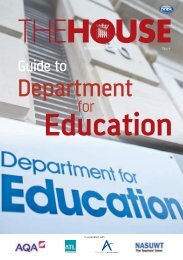Oracy
2fcBkno
2fcBkno
Create successful ePaper yourself
Turn your PDF publications into a flip-book with our unique Google optimized e-Paper software.
Social disadvantage<br />
Numerous studies show that socio-economically disadvantaged<br />
children’s spoken language development in their first term of<br />
nursery school is lower on average than both that of their more<br />
advantaged peers and also in comparison with their own nonverbal<br />
cognitive abilities. 103,104,105 This is crucially important<br />
because, as Roulstone et al. explore in their systematic review of<br />
the existing research, a child’s ability to use spoken language has<br />
an important effect on his or her level of educational attainment.<br />
Poor spoken language ability can therefore act as a mechanism<br />
for entrenching socio-economic inequality in education.<br />
‘There are now clear causal<br />
associations between a<br />
child’s level of language and<br />
communication development<br />
at school entry age and how<br />
this impacts on their literacy<br />
learning and attainment’<br />
Roulstone et al. 106<br />
Furthermore, gaps in language development between more and less socioeconomically advantaged<br />
children tend to widen rather than narrow as children progress through school. This pattern is<br />
particularly stark for learners with SLCN. 107 Children entering school from socioeconomically<br />
disadvantaged backgrounds are also more likely than their more advantaged peers to have a form<br />
of SLCN. Alongside worse educational outcomes, these children are on average more likely to be<br />
permanently excluded, and between 60% and 90% of young people in the justice system have a<br />
form of SLCN, often undiagnosed prior to offending. 108,109<br />
<strong>Oracy</strong>’s links to employability (explored above) can act as another mechanism for entrenching socioeconomic<br />
inequality. In its qualitative evaluation of non-educational barriers to elite professions the<br />
Social Mobility and Child Poverty Commission found that elite firms define ‘talent’ according to a<br />
number of factors including strong communication and debating skills, confidence and ‘polish’. 110 The<br />
report finds:<br />
‘[C]urrent definitions of talent can arguably be closely mapped on to socioeconomic status,<br />
including middle-class norms and behaviours. As such, …the current definition of talent may<br />
disadvantage talented students who have not benefited from similar educational advantages or<br />
been socialised in a middle-class context, no matter how great their aptitude for a professional<br />
career in all other respects’ Ashley et al. 111<br />
Analysis by the Sutton Trust corroborates this and suggests that extroverted people – those who are<br />
more confident, sociable or assertive – have ‘a 25% higher chance of being in a high-earning job,’ and<br />
that personality and aspirations are strongly affected by social background. 112 The report finds:<br />
‘For a variety of reasons, children from more advantaged backgrounds appear more likely to<br />
develop personality characteristics and aspirations which subsequently benefit them in the labour<br />
market’ de Vries and Rentfrow 113<br />
Whilst it would be wrong to suggest that schools should teach all pupils to be extroverted, they should<br />
support pupils’ in developing the self-confidence and social skills that will enhance their life chances. 114<br />
Many teachers recognise oracy’s role in<br />
tackling social disadvantage. As one explains:<br />
“I think it’s of benefit to all pupils, but the teaching<br />
of it is of benefit specifically to our comprehensive<br />
cohort, because there are a lot of kids [who] get a lot<br />
of this exposure anyway. They get it through debates<br />
at the dinner table, they get it through being raised<br />
in certain ways and having certain schooling, and<br />
I think they start with such an advantage”<br />
Andrew Fitch, Head of English & Director of Spoken Literacy,<br />
Highbury Grove School<br />
39




